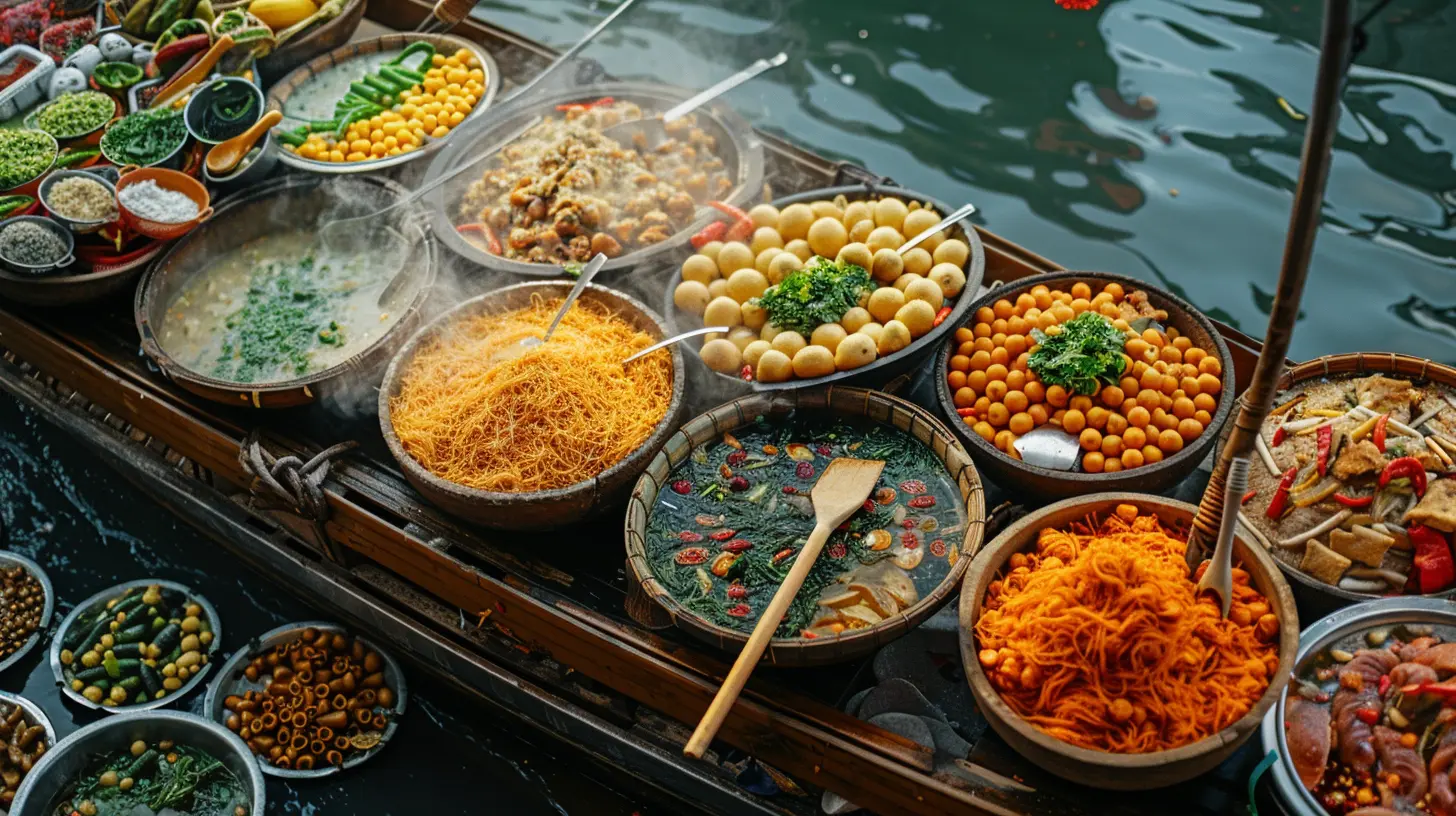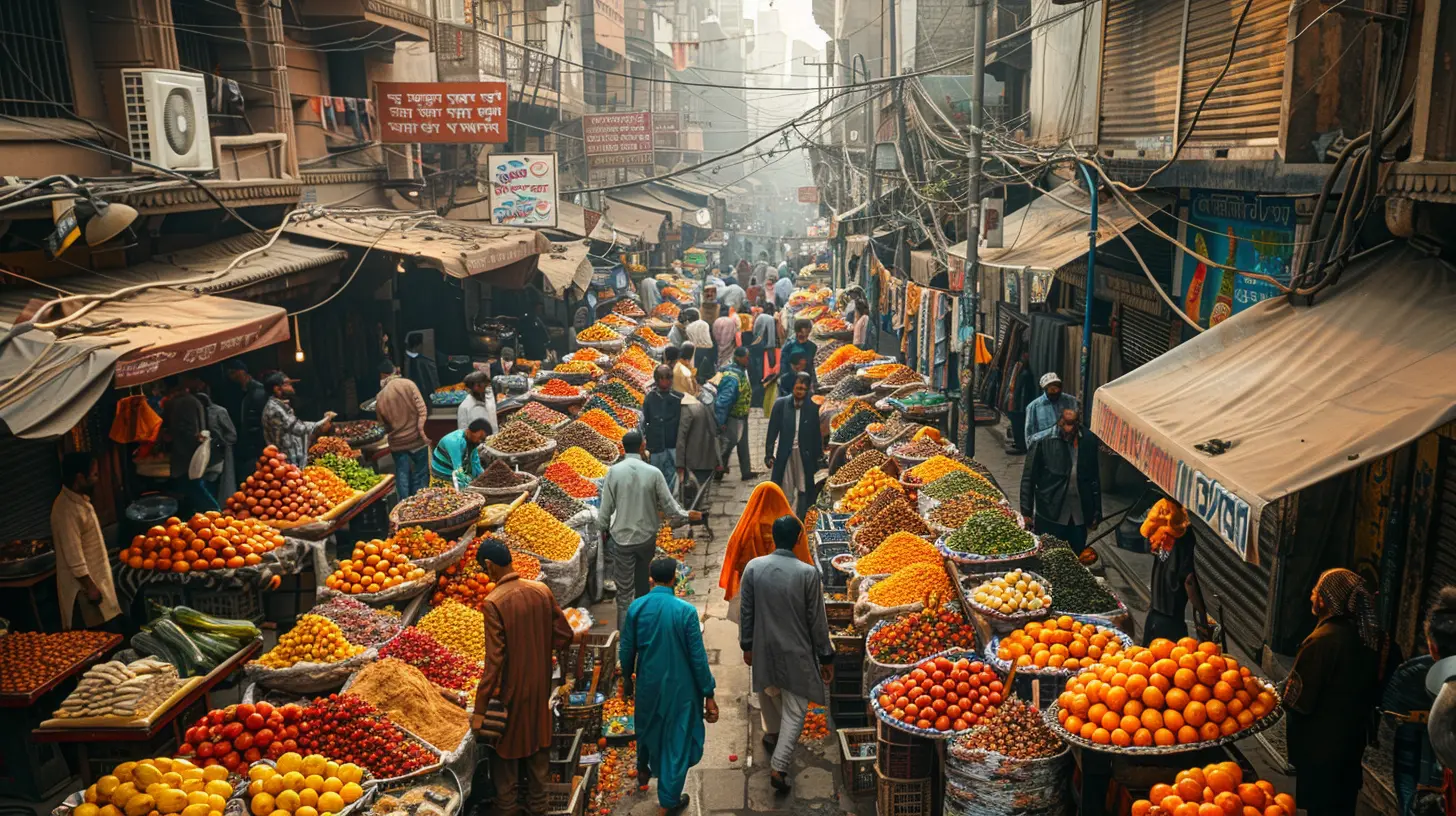4 April 2025
Food markets are more than just a place to grab fresh produce or a quick bite—they are the beating heart of a city’s culture. Whether it's the lively chatter of vendors in Bangkok, the aroma of spices in Marrakech, or the seafood stalls of Sydney, these markets tell the story of a city's history, traditions, and way of life.
But why do food markets hold such importance in global cities? And what makes them such an unmissable part of the local experience? Grab a seat, maybe a snack, and let's dive into the world of food markets!

A Window into Culture and Tradition
Food markets are living museums. They carry centuries-old traditions, showcasing the culinary identity of a place. Every region has signature dishes and ingredients that define its cuisine, and the best place to experience them is at a local market.Think about the floating markets of Thailand—where boats packed with tropical fruits, noodles, and coconut pancakes float along narrow waterways. Or La Boqueria in Barcelona, where jamón ibérico, fresh seafood, and colorful candies tempt visitors at every corner. These markets aren’t just places to buy food; they're an immersive cultural experience.
The Role of History in Markets
Markets have been around for centuries. In medieval Europe, town squares were filled with stalls where farmers and traders sold their goods. In Asia, bustling bazaars served as hubs of commerce along ancient trade routes. Even today, food markets carry that legacy, bringing together people from all walks of life.For example, Istanbul’s Grand Bazaar started as a trading center during the Ottoman Empire, and though it has evolved, it remains a marketplace rich in flavors, from traditional Turkish delight to fragrant spices. These markets are living proof of how food has connected civilizations for centuries.

A Feast for the Senses
Have you ever walked into a food market and instantly felt overwhelmed in the best way? The colors, the scents, the sounds—it’s a full-on sensory overload.The Smells and Tastes That Define a City
Markets provide a crash course in a city's culinary identity. The air is filled with the smoky scent of grilled meats, the sweetness of ripe fruits, and the sharpness of fresh herbs. Take a stroll through Tsukiji Outer Market in Tokyo, and you'll be greeted by the umami-rich smell of sizzling yakitori, the delicate fragrance of matcha, and the unmistakable brininess of fresh sashimi.Some cities are practically defined by the flavor of their markets! Mexico City’s Mercado de la Merced, for instance, fills the air with the bold aroma of chiles, tamales, and sizzling tacos al pastor. It’s a true paradise for food lovers.
The Sounds of Life
Markets are rarely silent. The calls of vendors, the chatter of locals bargaining for the best price, the clatter of pots and pans—it’s a symphony of daily life. In Marrakech’s Jemaa el-Fnaa square, you’ll not only hear the buzz of food vendors but also the rhythmic beat of street musicians and the storytelling of local performers.This lively atmosphere makes markets dynamic and unforgettable. Every visit is a new experience, shaped by the time of day, the season, and the people around you.

Supporting Local Communities and Sustainability
Food markets are essential for local economies. They provide income for farmers, fishermen, and small business owners while offering affordable food options for city dwellers. When you buy from a local market, you're not just purchasing ingredients—you’re directly supporting families and traditions that have been passed down for generations.Farm-to-Table in Its Truest Form
One of the biggest trends in modern dining is the farm-to-table movement. But guess what? Food markets have been doing this for centuries! Instead of mass-produced goods traveling thousands of miles, markets often offer locally sourced, seasonal produce.In cities like Paris, the Marché Bastille is a prime example of this. Farmers and artisans bring their best cheeses, fresh-baked bread, and organic vegetables straight to the hands of eager shoppers. It’s about as fresh as it gets!
Fighting Food Waste
Another hidden benefit of local markets? They help combat food waste. With fewer middlemen involved, less food gets tossed out due to strict supermarket appearance standards. Many vendors even sell “ugly” produce at a discount, ensuring that perfectly good food doesn’t go to waste.
A Social and Culinary Gathering Place
Markets aren't just about food—they're about people. They bring together locals and tourists, young and old, to share in the joy of food and community.Bringing People Together
Markets are one of the few places where you’ll find business professionals grabbing a quick bite next to a grandmother selecting vegetables for dinner. They break down social barriers because everyone, no matter their background, connects over food.In Singapore, hawker centers act as a melting pot of cultures. Here, Chinese, Malay, and Indian vendors serve up dishes that reflect the country’s rich diversity. Can you think of a better way to get to know a place than by sharing a meal with the locals?
Street Food and Market Culture
Food markets often serve as the birthplace of a city’s most iconic street food. The bustling stalls of Bangkok’s Or Tor Kor Market, for example, are where many of the city’s best pad thai and mango sticky rice dishes are found. Similarly, Borough Market in London is packed with gourmet food vendors offering everything from artisanal cheeses to traditional British pies.For travelers, tasting street food at a market is like having a direct line to a city’s soul. It’s where recipes are passed down, where secret ingredients make their way into dishes, and where food is prepared with decades of skill and passion.
The Challenge of Modernization
Despite their importance, many historic food markets are under threat. As cities modernize, supermarkets and online grocery shopping are becoming more popular. Some markets struggle to keep up, and others face redevelopment pressures.The Impact of Globalization
With chain stores and fast food dominating urban landscapes, traditional food markets must find ways to adapt. Some have embraced tourism, while others focus on organic and specialty foods to attract a new generation of customers.Take Mercado San Miguel in Madrid—it’s transformed from a traditional market into a stylish food hall featuring gourmet tapas and fine wines. While some argue this takes away from its authenticity, it has helped keep the market alive in a rapidly changing world.
Preserving Cultural Heritage
Luckily, many cities recognize the cultural significance of their markets and are working to preserve them. Countries like Japan, for example, have designated certain food markets as cultural heritage sites, ensuring their survival for future generations.For travelers, supporting these markets by shopping, eating, and engaging with vendors is one of the best ways to contribute to their preservation. After all, markets are more than just a place to buy food—they’re a living, breathing piece of history.
Conclusion
Food markets aren’t just about eating—they’re about experiencing the soul of a city. They’re where history, tradition, and daily life collide in the most flavorful way possible. From the street vendors of Mexico City to the spice markets of Istanbul, every market tells a story.So, the next time you find yourself in a new city, skip the fancy restaurants for a moment and hit up the local food market. Wander the stalls, chat with the vendors, and, most importantly, taste your way through the culture. Because, in the end, there’s no better way to understand a place than through its food.


